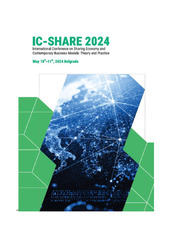Please use this identifier to cite or link to this item:
https://rfos.fon.bg.ac.rs/handle/123456789/2797| Title: | Sharing Economy Index: How can it be altered? | Authors: | Maričić, Milica Uskoković, Veljko Drinjak, Nikola Panzaru, Emil |
Keywords: | Sharing economy Index;Ivanovic distance;composite indicator;weighting scheme;CIDI | Issue Date: | 2024 | Publisher: | University of Belgrade – Faculty of Organizational Sciences, Jove Ilića 154, Belgrade, Serbia | Abstract: | Sharing economy is defined as a business model in which individuals (providers) share an unused resource with others (consumers) for a predefined period and price via online platform. Since the model first emerged in the 2000s, it quickly spread in industries such as transport, tourism, apparel, working space, and others. With it, the need of decision-makers and practitioners for a metric and ranking system, emerged. To this day, several metrics have been devised. The composite index which is the focus of this study is the Sharing Economy Index (SEI) 2023, published by Consumer Choice Center. The interest of the paper is to observe and scrutinise the current weighting scheme of the index by applying the statistical multivariate analysis Ivanovic distance (I-distance) and Composite I-distance Indicator (CIDI) methodology. The results show that the SEI structure should be in four pillars, with the most importance awarded to E-Scooters indicator. This paper attempts to draw attention to the field of composite indicators in the field of sharing economy and their methodological aspects. |
URI: | https://rfos.fon.bg.ac.rs/handle/123456789/2797 |
| Appears in Collections: | Radovi istraživača / Researchers’ publications |
Files in This Item:
| File | Description | Size | Format | |
|---|---|---|---|---|
| bitstream_4065.pdf | 2.24 MB | Adobe PDF |  View/Open |
Page view(s)
22
checked on Dec 28, 2025
Download(s)
10
checked on Dec 28, 2025
Google ScholarTM
Check
Altmetric
This item is licensed under a Creative Commons License

